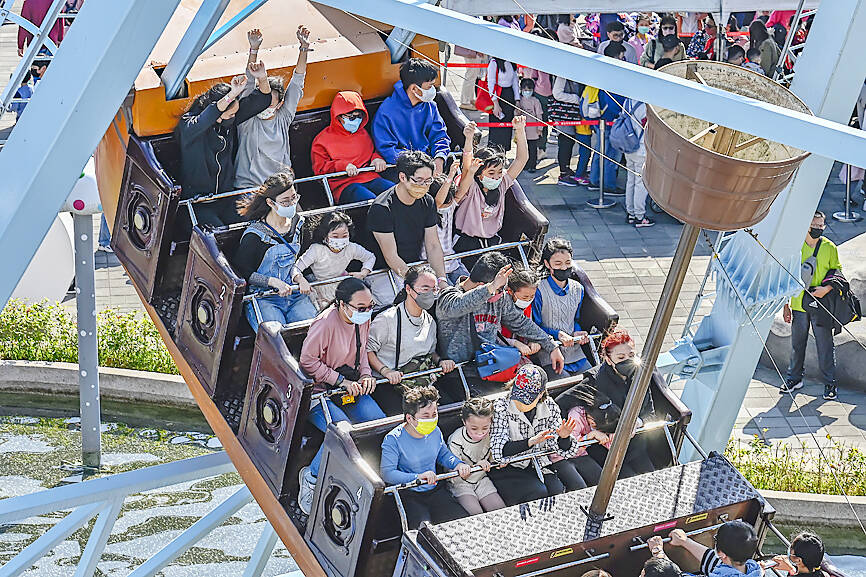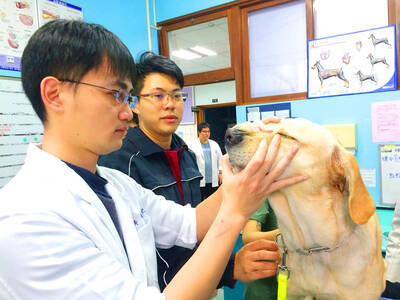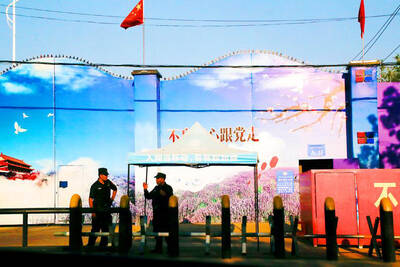Staying up late and excitement could affect the immune system and cause dizziness or short-term hearing problems, a doctor said on Saturday.
Many Taiwanese stay up late and play mahjong or engage in other activities with family members during the Lunar New Year holiday, but this could cause problems, Kaohsiung Medical University’s Chung-Ho Memorial Hospital physician Chang Ning-chia (張寧家) said.
The Lunar New Year holiday this year runs from Friday last week through Sunday.

Photo: Chen Chih-chu, Taipei Times
“A lack of sleep and excitement can easily confuse the immune system. If that leads to inflammation of the vestibulocochlear nerve, dizziness could occur,” he said.
Confusion of the immune system could be caused by a sudden change in sleep patterns and could be exacerbated by large differences in day and night temperatures that occur in winter, he added.
The condition is sometimes accompanied by an acute inner-ear infection and temporary hearing loss, Chang said.
However, if people also experience vertigo that persists for more than a few hours, they should seek medical help, he said.
“People should not worry too much if vertigo goes away in a few hours, as it was probably caused by fatigue or a lack of sleep,” he said.
“However, if vertigo lasts for a few days, it might mean that the vestibulocochlear nerve has become inflamed and needs attention,” he added.
Each ear has a vestibulocochlear nerve and they need to send signals to the brain in tandem, Chang said, adding that the signal is disrupted when one of the nerves become inflamed.
Another cause of dizziness might be benign paroxysmal positional vertigo, which happens when a person moves their head rapidly, for example by repeatedly lying down and getting up, he said, adding that the symptom usually goes away on its own.
“People with Meniere’s disease also experience dizziness, vertigo and hearing loss, and could also experience migraines and tinnitus,” Chang said.
“Those with the condition should eat lightly and limit the intake of salt, coffee, pickled foods and fermented dairy products,” he said.
Motion sickness is also common during holidays, due to changes in sleeping and eating patterns, as well as time spent on the road, Chang said, adding that people with the symptom can take motion-sickness medication that contains antihistamines.
“If you feel sick while driving, pull over and close your eyes or stare at something far off to reduce the vestibular eye movement reflex caused by stimulation of the balance system,” Chang said.
“Breathing fresh air also helps,” he said, urging drivers not to eat too much before hitting the road.

Former Czech Republic-based Taiwanese researcher Cheng Yu-chin (鄭宇欽) has been sentenced to seven years in prison on espionage-related charges, China’s Ministry of State Security announced yesterday. China said Cheng was a spy for Taiwan who “masqueraded as a professor” and that he was previously an assistant to former Cabinet secretary-general Cho Jung-tai (卓榮泰). President-elect William Lai (賴清德) on Wednesday last week announced Cho would be his premier when Lai is inaugurated next month. Today is China’s “National Security Education Day.” The Chinese ministry yesterday released a video online showing arrests over the past 10 years of people alleged to be

THE HAWAII FACTOR: While a 1965 opinion said an attack on Hawaii would not trigger Article 5, the text of the treaty suggests the state is covered, the report says NATO could be drawn into a conflict in the Taiwan Strait if Chinese forces attacked the US mainland or Hawaii, a NATO Defense College report published on Monday says. The report, written by James Lee, an assistant research fellow at Academia Sinica’s Institute of European and American Studies, states that under certain conditions a Taiwan contingency could trigger Article 5 of NATO, under which an attack against any member of the alliance is considered an attack against all members, necessitating a response. Article 6 of the North Atlantic Treaty specifies that an armed attack in the territory of any member in Europe,

LIKE FAMILY: People now treat dogs and cats as family members. They receive the same medical treatments and tests as humans do, a veterinary association official said The number of pet dogs and cats in Taiwan has officially outnumbered the number of human newborns last year, data from the Ministry of Agriculture’s pet registration information system showed. As of last year, Taiwan had 94,544 registered pet dogs and 137,652 pet cats, the data showed. By contrast, 135,571 babies were born last year. Demand for medical care for pet animals has also risen. As of Feb. 29, there were 5,773 veterinarians in Taiwan, 3,993 of whom were for pet animals, statistics from the Animal and Plant Health Inspection Agency showed. In 2022, the nation had 3,077 pediatricians. As of last

XINJIANG: Officials are conducting a report into amending an existing law or to enact a special law to prohibit goods using forced labor Taiwan is mulling an amendment prohibiting the importation of goods using forced labor, similar to the Uyghur Forced Labor Prevention Act (UFLPA) passed by the US Congress in 2021 that imposed limits on goods produced using forced labor in China’s Xinjiang region. A government official who wished to remain anonymous said yesterday that as the US customs law explicitly prohibits the importation of goods made using forced labor, in 2021 it passed the specialized UFLPA to limit the importation of cotton and other goods from China’s Xinjiang Uyghur region. Taiwan does not have the legal basis to prohibit the importation of goods